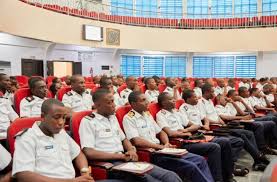 By Oluyinka Onigbinde
By Oluyinka Onigbinde
Years after graduating from the Maritime Academy of Nigeria, Oron (MAN), cadets from the institution have lamented their continued inability to secure sea time training, a mandatory requirement for the progression and utilization of their Certificates of Competency (CoC).
Findings by Shipping Position Daily revealed that many graduates from the academy are currently stranded without jobs, with some of their certificates already expired or nearing expiration, a development they described as not only frustrating, but also disheartening.
In a chat with our correspondent, one of the affected graduates, Eugene Anete, who graduated from MAN Oron in 2021, said he has remained unemployed since completing his programme. According to him, the lack of sea time and structured transition from academy to a vessel has rendered his CoC practically useless.
“There’s nothing right now. We are still looking for jobs and sea time. Most companies now ask for cadets with experience, which we don’t have. If we don’t have sea time, how do we gain experience?” he asked.
Eugene, who expressed deep frustration, said his medical certificate expired in January and that he has no money to renew it.
“My papers are expiring. My medical card expired since January. If I don’t get sea time soon, I won’t be able to renew my CoC either. I’ve been out of school for nearly three years now, and there’s nothing to show for it.”
He also decried the absence of training vessels in Nigeria, pointing out that cadets in countries like Ghana, Greece, and India have access to such ships, which help them transition seamlessly into the profession.
“In other countries, when cadets graduate as officers, they have access to training vessels. But here, after graduation, we still come out as cadets with no job and no structure to support us,” he said.
Another graduate, Victoria Ekong also told Shipping Position Daily that despite finishing with good grades, she now works at a local supermarket in Calabar just to survive.
“I’ve applied to countless companies. I’ve attended job fairs, sent out CVs, followed up on maritime job groups, but nothing. We were told the certificate would open doors, but right now, those doors are shut. It’s frustrating.”
She added that the lack of practical exposure during their training has become a major barrier, as shipping companies are unwilling to take on cadets without sea experience.

Two other anonymous graduates of MAN Oron also confirmed the widespread nature of the issue. One disclosed that out of a class of over 50 cadets, fewer than five have secured sea time in the last three years.
“The rest of us are just at home or doing other unrelated jobs. Some are even considering abandoning the maritime industry entirely,” the graduate said.
He claimed that one of them is currently doing commercial motorcycle business (okada rider) in Lagos.
Another revealed that many are now forced to explore expensive alternatives by paying foreign agents thousands of dollars just to get onboard ships abroad for training.
“Some pay up to $4,000 to get placement on vessels in the Middle East. For those of us who don’t have that kind of money, we’re stuck,” he lamented.
The graduates collectively pointed to a lack of intervention from the school management, the Ministry of Marine and Blue Economy, and the appropriate regulatory agency- the Nigerian Maritime Administration and Safety Agency (NIMASA).
They noted that while the MAN Oron alumni group frequently shares job posts in WhatsApp groups, such gestures are largely ineffective without structural reforms.
“We appreciate the effort of some alumni who share job openings, but this isn’t about posting links. We need the government and the academy to create a structured transition plan. Other countries have done it; why not Nigeria?” Eugene queried.
A maritime training consultant, who pleaded anonymity, said the situation has become a national embarrassment and threatens the credibility of Nigeria’s maritime certification system.
“If we continue to graduate cadets without a defined pathway to sea time, international bodies like the IMO may start questioning the validity of our certifications. The government needs to invest in a national training vessels and form partnerships with shipping lines to absorb graduates,” he advised.















